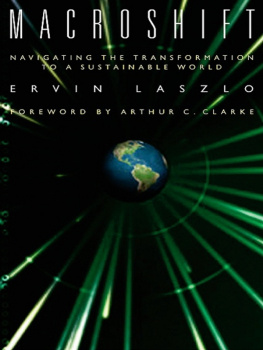A NOTE ABOUT THIS ADOBE E-BOOK
This E-Book edition contains live links that when clicked will jump to the appropriate location either within this book or on the Internet. The Internet links require a web browser and an active Internet connection. All links are indicated by blue type.
Macroshift
Portions of this book were previously published in Third Millennium: the Challenge and the Vision. Gaia Books, London, 1996, and Macroshift: Creating the Future in the Early 21st Century to Excel, San Jose, New York, Lincoln, and Shanghai, 2000
Copyright 2001 by Ervin Laszlo
All rights reserved. No part of this publication may be reproduced, distributed, or transmitted in any form or by any means, including photocopying, recording, or other electronic or mechanical methods, without the prior written permission of the publisher, except in the case of brief quotations embodied in critical reviews and certain other noncommercial uses permitted by copyright law. For permission requests, write to the publisher, addressed Attention: Permissions Coordinator, at the address below.
Berrett-Koehler Publishers, Inc.
235 Montgomery Street, Suite 650
San Francisco, California 94104-2916
Tel: (415) 288-0260, Fax: (415) 362-2512
www.bkconnection.com
Ordering information for print editions
Quantity sales. Special discounts are available on quantity purchases by corporations, associations, and others. For details, contact the Special Sales Department at the Berrett-Koehler address above.
Individual sales. Berrett-Koehler publications are available through most bookstores. They can also be ordered directly from Berrett-Koehler: Tel: (800) 929-2929; Fax: (802) 864-7626; www.bkconnection.com
Orders for college textbook/course adoption use. Please contact Berrett-Koehler:
Tel: (800) 929-2929; Fax: (802) 864-7626.
Orders by U.S. trade bookstores and wholesalers. Please contact Ingram Publisher Services, Tel: (800) 509-4887; Fax: (800) 838-1149; E-mail: customer.service@ingram publisherservices.com; or visit www.ingrampublisherservices.com/Ordering for details about electronic ordering.
Berrett-Koehler and the BK logo are registered trademarks of Berrett-Koehler Publishers, Inc.
First Edition
Hardcover print edition ISBN 978-1-57675-163-3
PDF e-book ISBN 978-1-57675-178-7
IDPF ISBN: 978-1-60994-366-0
2010-1
Interior Design: Gopa Design & Illustration
Proofreader: Stewart Burns
Copy Editor: Kay Mikel, WordWorks
Indexer: Paula C. Durbin-Westby
Production: Linda Jupiter, Jupiter Productions
Cover Design: Richard Adelson
for Christopher and Alexander
macroshift navigators of excellence
with pride and affection
The Club of Budapest, founded in 1993 by Ervin Laszlo, is an informal association of ethical globally as well as locally active opinion leaders in various fields of art, science, religion, and culture, dedicated to our common future. Its members include the Dalai Lama, Vclav Havel, Mikhail Gorbachev, Desmond Tutu, Elie Wiesel, Peter Ustinov, Peter Gabriel, and young and creative people in many parts of the world. They place their names and energy into the service of what they consider the crucial mission of our time: catalyzing the emergence of adapted vision and valuesin society by evolving our individual and collective consciousness.
Foreword by Arthur C. Clarke
ANYONE WHO ATTEMPTS to write about the future should take warning from all the failures of the past. Even in the restricted field of technology, which is the only one where any kind of forecasting is possible, success has been very limited. And in geopolitical matters, it has been virtually nonexistent: did anyone predict the events of the last decade in Europe? So in this book, Ervin Laszlo, scientist, and founder and president of the Club of Budapest, makes a vital point: the future is not to be forecast, but created. What we do today will decide the shape of things tomorrow. Especially the way we perceive the challenges that await us, and the vision we develop for coping with them. His book furnishes essential guidelines for creating a positive scenario for our common future: for the new thinking and acting that this calls for.
I leave until later Laszlos ideas, insights and injunctionsI begin by addressing the questions of engineering hardware, the area closest to my interests. Here, too, some of the warnings issued by Laszlo are relevant: for example, against obeying the technological imperative. Not all things that can be produced should, evidently, actually be produced. But there are many fascinating things that we can, and probably will, produce, and these deserve to be thought about.
The past record of technological forecasting is not encouraging. The failures of people to forecast the developments that awaited them fall into two categories: the hopelessly pessimistic and the overly optimistic. This may be because our logical processes are linear, whereas the real world obeys nonlinear processes, often with exponential laws. Thus we tend to exaggerate what can be done in the short run but hopelessly underestimate ultimate possibilities. Here are some of my favorite examples of this phenomenon.
x
When the news of Alexander Graham Bells invention reached Britain, the Engineer-in-Chief of the Post Office exclaimed loftily: The Americans have need of the telephonebut we do not. We have plenty of messenger boys. That is what I call a failure of imagination. Here, in contrast, is a failure of nerve, based on the same example. When the mayor of a certain American city heard about the telephone, he was wildly enthusiastic. I can see the time, he exclaimed, when every city will have one. What would he have thought, could he have known that one day many individuals would have half a dozen....
Quite recently I came across another example of a comic failure, by a man determined not to be outguessed by the future. Around the end of the last century, the president of the Carriage Builders Association of Great Britain lectured his fellows on the subject of the newly invented motor car. Anyone would be a fool, he said, who denied that the motor car has an important future. But he would be an even bigger fool if he suggested that it would have any impact on the horse and carriage trade.
However, I cannot leave the subject of technological prediction without quoting from Norman Augustine, CEO of Martin Marietta and author of the wise and witty Augustines Laws. He recently pointed to what he called Coolidges revenge, due around 2020. Apparently, when Calvins administration was presented with an estimate of some $25,000 for the purchase of a dozen airplanes, the President asked testily, Why cant they buy oneand let the aviators take turns flying it? Well, Norm has calculated that, extrapolating the present rising cost of aircraft and electronics, in the twenty-first century the U.S. budget will indeed be able to afford just one airplane!
As everyone knows, we are now in the midst of one of the greatest technological revolutions in history, and if the bifurcations in the area of economy, ecology, and politics outlined in this report are adequately managed, the end will be nowhere in sight. Who could have imagined that something the size of a fingernail, constructed by technology inconceivable only a few decades ago, could change the face of commerce, industry, and everyday human life? Although we science fiction writers assumed that computers would play an important role in the future (Hi there, HAL!), nobody dreamed that one day the world population of computers would exceed that of human beings.











